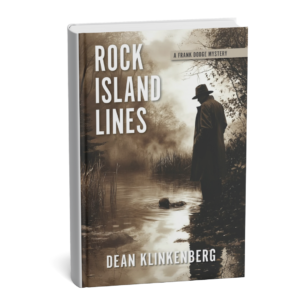
He knows not to bury the lead. But if he follows this story, he could end up six feet under…
Travel writer Frank Dodge needs a breakout piece to resurrect his sinking career. So when he gets a tip about one of the last surviving descendants of the notorious mobster John Looney, he drops everything and heads to Davenport, Iowa. But after a long and boozy interview, his article turns into a murder mystery when his source is found floating face down in the Mississippi.
Pegged by the police as their prime suspect, Dodge vows to catch the real killer. With a helping hand from his homicide detective friend, he uncovers a deadly rivalry going back to 1900’s gambling halls and gang wars. But the deeper he digs, the more he fears he’ll wind up another casualty watering a bloody family tree.
Can Dodge unearth the culprit behind the grisly revenge before he becomes tomorrow’s headline?
Rock Island Lines is the first full-length novel in the noir-style Frank Dodge mystery series. If you like real-life gangsters, page-turning action, and a dash of snarky humor, then you’ll love Dean Klinkenberg’s gripping whodunit.
Buy Rock Island Lines to stop a lethal legacy today!
Buy Rock Island Lines:
Find an on-line retailer
Buy it at an Independent Bookstore.
In St. Louis? Buy it at Dunaway Books.
Check out the video trailer for Rock Island Lines.
Editorial Reviews
“…the inclusion of historical passages to frame the story actually helps to reaffirm some of the true history of John Looney… an easy read.”
—Roger Ruthhart, Dispatch-Argus
For Book Clubs:
Book Summary
Travel writer Frank Dodge arrives in the Quad Cities to research John Looney, a notorious 1920s gangster who once ruled Rock Island’s criminal underworld. When he meets a young chiropractic student who claims to be Looney’s descendant, Frank thinks he’s found the perfect angle for his story. But within hours, the student is dead, and Frank finds himself caught between suspicious police, a determined FBI agent, and long-buried secrets that some people will kill to protect. Set against the backdrop of the Mississippi River, this atmospheric mystery explores how the past shapes the present and the unexpected ways that history can come back to haunt us.
Discussion Questions
1. How does the Mississippi River function as both setting and character in the novel? What role does it play in shaping the story and its themes?
2. The book explores how family legacies influence who we become. How do different characters wrestle with their family histories? How do they either embrace or reject their heritage?
3. Frank Dodge is an unconventional protagonist – a former therapist turned travel writer. How does his background influence how he approaches solving the mystery?
4. The novel weaves together historical events with contemporary crime. How effectively does the author connect past and present? What parallels do you see between the two time periods?
5. Discuss the friendship between Frank and Jefferson. How does their long history affect their interactions? What does each bring to their partnership?
6. The theme of revenge plays a central role in the story. How do different characters justify their actions? Is revenge ever justified?
7. How does the author use the Quad Cities setting? What role do local landmarks and history play in the story?
8. Several characters struggle with questions of identity. How do they define themselves in relation to their past? How do they try to change their stories?
9. What role does truth play in the novel? How do different characters relate to truth and deception?
10. The book explores how we create narratives about ourselves and our families. How do these stories help or harm the characters?
11. Discuss the moral ambiguity present in the novel. How do characters justify actions that might otherwise be considered wrong?
12. How does the author use the contrast between the tourist-friendly face of the Quad Cities and its grittier aspects? What does this say about how communities deal with their histories?
Topics for Further Discussion
- The history of organized crime in the Midwest
- The role of the Mississippi River in American culture
- How communities remember (or forget) their darker histories
- The impact of family legacy on personal identity
- The ethics of revenge and vigilante justice
- The relationship between truth and storytelling